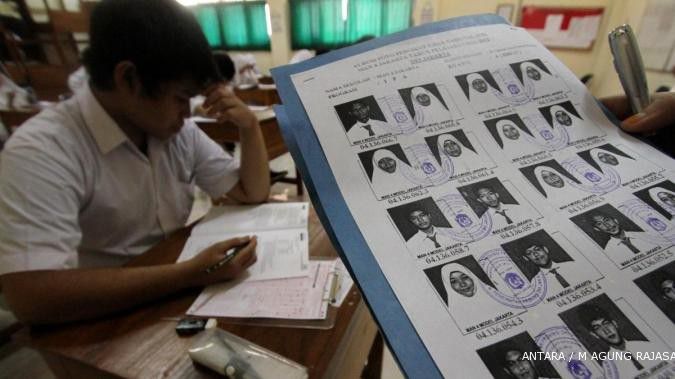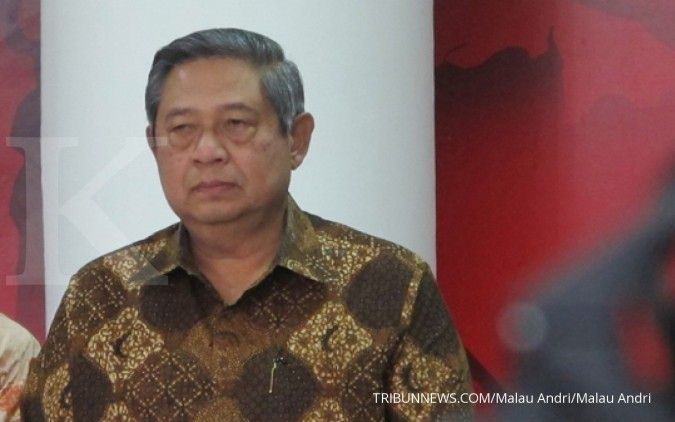JAKARTA. In another landmark reform for the country’s educational system, Culture and Primary and Secondary Education Minister Anies Baswedan announced on Monday that the ministry would end the function of national exams as the sole determining factor of student graduation.
The government will look for a better exam for 2015; it will still be a metric of educational quality in the region but it will no longer burden students in the way that the previous exam did for the past 10 years.
Anies said there were eight factors that were used to qualify the success of the educational system, all of which had been outlined by the ministry and which included the exams, teachers, learning materials and school infrastructure.
“We have been emphasizing [student] evaluations as parameters of success, while neglecting other factors,” Anies told reporters after attending a meeting with the heads of educational agencies in Jakarta on Monday.
One possible alternative is that a student’s graduation will be determined by their individual schools.
Previously, in order to pass the national exam, secondary students had to score at least a 4 in every subject and had to have an average score (that factored in the national exam, school exams and reports) that was no lower than 5.5.
High school students who failed the national exam had to take another test the following year or an equivalent test and receive a different kind of diploma than their peers.
The equivalency test was usually taken by anyone who had dropped out of school but later wanted to obtain a degree that was equivalent to a high school diploma.
Many students reportedly experienced depression while others allegedly cheated on the exam with their friends and teachers.
Anies, however, did not elaborate on how the new mechanism could be effective, saying that the ministry was still working on the new concept.
Nizam, the head of the ministry’s Educational Evaluation Center (Puspendik), confirmed that the exam policy would be changed.
“Yes, we will make [several adjustments],” he said, adding that the ministry would issue official information on how the new scheme would be carried out in 2015.
In 2006, it was reported that a group of teachers filed a lawsuit at the Central Jakarta District Court demanding the abolition of the national exams. The court granted the request and the government appealed the verdict.
In 2009, the Supreme Court rejected the government’s appeal, saying that the examinations could only be held if their implementation was improved.
Yet the ministry has carried on with the exams with several adjustments to the system, but retained its penalizing function that determined a student’s graduation.
Another adjustment to the exams that is currently being considered is whether or not the exams should be done online in 2015.
However, only a few provinces and districts have been prepared for a trial. “Not all educational offices are ready for the trial due to a lack of computer and Internet facilities, but we will carry out the trial in the provinces or districts that are ready,” Anies said.
Anies promised that the concept of the new version of the national exams would be implemented perfectly. (wit)
National exams no longer to determine graduation
December 30, 2014, 10.51 AM
/2014/04/16/1121802215.jpg)
ILUSTRASI. Sejauh ini, hanya saham GJTL yang melaju paling kencang. Kemarin (11/7), saham GJTL naik 0,83%, mengakumulasi penguatan 117,86% sejak awal tahun 2023.
Source: The Jakarta Post
| Editor: Hendra Gunawan
Latest News
-
March 02, 2026, 04.45 PM
Indonesia has Seized 5 Million Hectares of Palm Oil Plantations, Task Force Says
-
March 02, 2026, 01.10 PM
Asian Assets Slide as Mideast Strikes Spark Oil Spike, Haven Rush
-
March 02, 2026, 10.49 AM
Bank Indonesia Monitoring Market Movements in Response to Conflict in Middle East
-
February 25, 2026, 08.28 PM
Inpex to Solicit Bids for Construction of Indonesia's Abadi LNG Project in Mid-2026
-
February 24, 2026, 03.38 PM
Eni to Reach Final Investment Decision for Indonesia Gas Projects Next Month
-
February 24, 2026, 01.00 PM
Asia Stocks Try to Steady after Wall Street Selloff Sims Mood
-
February 23, 2026, 04.50 PM
Wall Street Futures and Dollar Slide on Trump Tariff Tumult
-
February 23, 2026, 02.17 PM
Indonesia's Government Spending Jumps 26% in January 2026
-
February 23, 2026, 01.47 PM
Indonesia's Government Spending Jumps 26% in January













